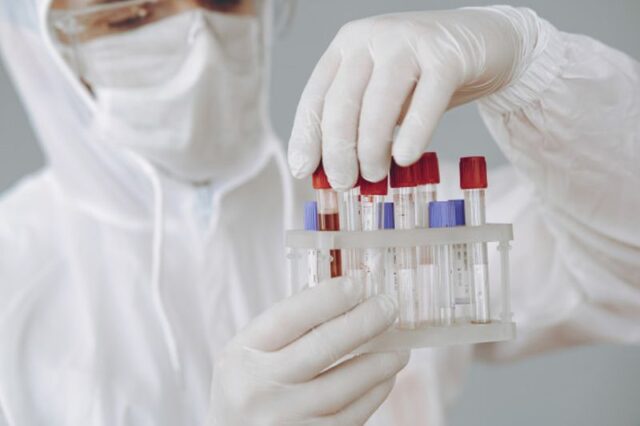
Blood disorders can vary from common and easy to treat, to very dangerous for the life that requires more serious medicines and hospital treatment. We need to do regular laboratory tests at least twice a year, or even often if there is a reason for that, so we can “catch” the potential diseases in the early stages, and treat them when it’s not too late and dangerous.
Some of the disorders and diseases can be easily treated with increased iron intake or supplements. Other issues sometimes require more serious treatment, or even receiving blood from donors.
Here are seven of the most common issues people can have with their blood:
1. Anemia

Mild cases of anemia can cause fatigue, heavy breathing, fast heartbeat, and severe weakness when trying to do something that requires more energy than usual. If you suffer from anemia, the level of red blood cells is lower than the minimum value. Also, the patients are usually iron deficient, which is a reason why the red cells can’t be synthesized naturally.
The reasons can be very different, but most often the causes of anemia are intestinal bleedings, low iron intake, problems with iron absorption, pregnancy and giving birth, or taking medicines like aspirin or naproxen. Sometimes ibuprofen may also cause anemia. If you have the most common and basic type, you can successfully treat with increased iron intake or even with iron infusions that are performed at hospitals.
2. Autoimmune hemolytic anemia
In these cases, the immune system is fighting against red blood cells, and even destroying them, decreasing the levels per unit, and causing anemia. This condition must be treated with help from doctors because if you do it by yourself, you can cause more problems. Patients often need to take suppress medicines that will stop the immune response of the body, but that can make them fragile and prone to other diseases that are usually controlled by the immune system.
3. Aplastic anemia

This disorder is often followed by more serious conditions, like hepatitis or HIV, or even a result of chemotherapy when cancer is treated. The bone marrow isn’t able to produce enough blood cells, and very often it can be treated with just medicines, and bone marrow transplant is highly recommended, so the body can maintain a nice balance. Sometimes women suffer it after giving birth, but often the body brings back the functions naturally.
4. Leukemia
When the level of white blood cells is elevating quickly, and overcrowd the other cells, it’s known as leukemia. Sadly, this is very dangerous and hard to treat this condition, which requires bone marrow transplant, transfusions, surgeries, chemotherapy, stem cell transplant, or even radiation so the doctors can help the patient.
This is a type of cancer that causes white cells to multiple inside the marrow. There are two types of leukemia, acute and chronic. Acute leukemia is rapid and harder to cure, and the chronic is slowly progressing, which gives the patient and doctors more time to detect and find the right treatment.
5. Lymphoma

Lymphoma is another form of blood cancer that attacks the lymph system, making the blood cells malignant and spreading abnormally through the whole body. The treatment features different types of drugs, chemotherapy, and radiation (or their combination), and sometimes it gives excellent results, extending the life of the patient.
6. Vein thrombosis
Clotting can cause a lot of problems, especially when a clot forms in the deep veins. Sometimes it can easily “travel” through the whole body, causing serious illness, or even death because it’s pretty hard to detect. The cloths can have stuck in the lungs or heart vessels, which sadly, often results in immediate death.
Often, patients are not aware that they have problems like this, and it’s discovered during the autopsy. But, you can prevent it from drinking enough water, maintaining a healthy weight, and being active all the time.
7. Hemophilia

Hemophilia is usually a genetic lack of proteins that help to produce clots that will help to heal the open wounds, often right after surgery. Patients can suffer intense bleeding even by a tiny wound. It should be treated with a combination of medicines, because if the bleeding lasts too long, it may cause lifetime damage to the patient’s body.
Can I use natural remedies and supplements to treat these conditions?
No one can give an exact answer to this question without knowing your history of diseases and drugs and medicines you took during the treatment. You can only consult your doctor, who knows everything about your history, and they will be able to recommend some supplements that may help you and make the situation better.
Maintaining a healthy lifestyle is also an important part of keeping your cardiovascular system in a good and highly functional condition. That means that you must take care of your weight, stay active even when you don’t feel like doing it, exercise a lot, increase the intake of iron, vitamins, and other important nutrients that will keep your blood system healthy. Ask your doctor for a proper diet and activity recommendation.

Don’t take any medicine without a doctor’s recommendation
Every day we see a lot of ads and sponsored posts with recipes and supplements, or even medicines that say they will prevent a wide range of diseases. But, we highly recommend you not to fall on marketing tricks, especially when it’s related to serious disorders and conditions. There is no magical pill that will erase all the issues we have, make us slim and healthy, or replace a nice balanced meal.
Blood conditions need to be treated with your doctor and a group of specialists in hematology. They are not a joke, especially when we know that may cost us a lot. If you have some weird symptoms or you feel bad, you need to immediately sign up for a doctor’s appointment, so they can make an examination and prescribe you appropriate medicines and treatments.







